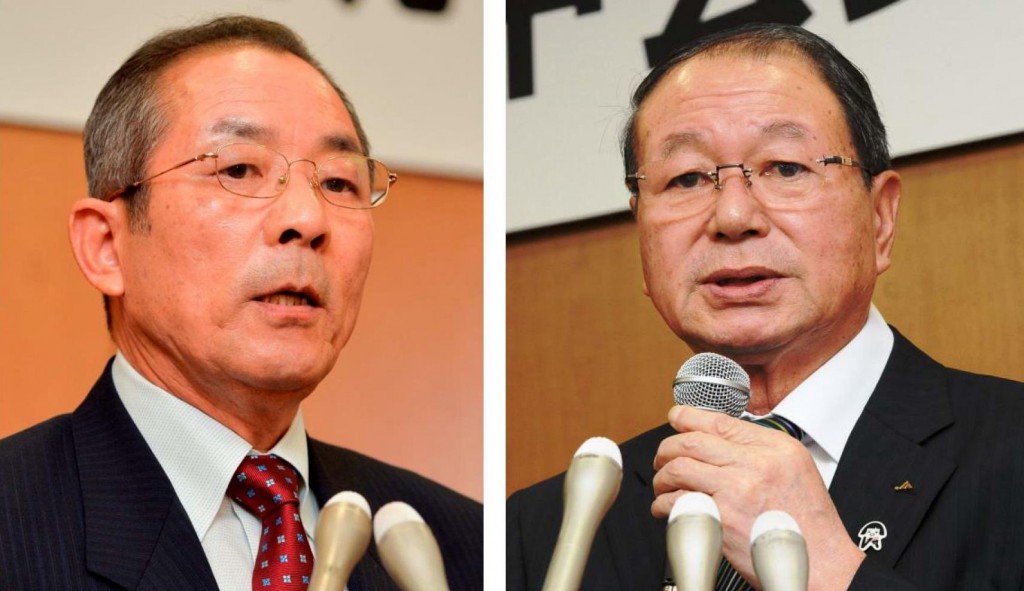
Choe Okuno (right) and Toru Nakaya, candidates for JA-Zenchu’s presidential election, make a speech at a gathering of delegates in Tokyo on Tuesday, June 23.
Two candidates running for the presidential election of the Central Union of Agricultural Co-operatives (JA-Zenchu) expressed their determination to reflect the voices of farmers and primary agricultural co-operatives in making the historical reform of the organization.
Speaking to some 160 representatives with a voting right who gathered in Tokyo on Tuesday, June 23, Choe Okuno, 68, president of Mie Prefectural Union of Agricultural Co-operatives, and Toru Nakaya, 65, president of Wakayama Prefectural Union of Agricultural Co-operatives, explained their views on how to expand farmers’ income and how to deal with the government’s move to restructure JA-Zenchu.
JA-Zenchu is having a presidential race for the first time in 10 years. The election was called after the incumbent president, Akira Banzai, expressed his intention to step down in April. Voting will be conducted by 251 delegates representing prefectural unions and primary JAs, with the deadline set for July 2. The ballots will be counted the same day, with the result officially approved at an extraordinary general meeting on Aug. 11.
Okuno said the agricultural co-ops reform put forth by the government is, for the JA group, like “black ships” – Western vessels which arrived in Japan during the Edo Period to urge the nation to open trade with the West. He said it will not be possible for the JA group to cope with reform under the existing system, adding that the current system of having JA-Zenchu at the top of a pyramid should be changed.
Meanwhile, Nakaya said turning JA-Zenchu into a general incorporated association means the organization’s dismantling and starting all over. He stressed the need to gather opinions from primary JAs on how JA-Zenchu executives should change their mindset and what kind of role the organization is expected to play, and to rebuild its foundation based on the views.
Regarding JA-Zenchu’s relationship with politics, Okuno said he will concentrate on discussing closely with the agriculture ministry to realize their policies. He also said it is important to let lawmakers deepen understanding on the actual situation of farmers, so that JA-Zenchu and politicians can work hand in hand, instead of confronting, for the future of the nation’s agriculture.
Nakaya said Japan’s agriculture should be given a higher position in politics, and called for realization of policies that conform to conditions of each region. He said the JA group’s political organization should be separated from the group in the future.
As for restricting non-farmer members’ use of JAs’ services, both candidates said JAs should offer services that make non-farmer members think they need JAs.
Okuno said the top priority issues for the group are declining rice prices, the Trans-Pacific Partnership free-trade talks and assisting disaster-hit regions recover from the Great East Japan earthquake and tsunami. He said the JA group, in conducting self-reform aimed at increasing farmers’ income and revitalizing regional economies, must have strong determination to reorganize itself, adding that he hopes to create a bottom-up decision making system that reflects voices of farmers and residents.
Nakaya said JA-Zenchu should assist primary JAs as much as possible to develop their agricultural businesses. In order to strengthen primary JAs, he called on the need to increase their members and expand their educational and cultural activities to reinforce their unifying power in local communities. He also said he will work on stepping up public relations activities of the group as a whole and programs to foster primary JAs’ executives to become leaders of co-operative movements.
(June 24, 2015)

